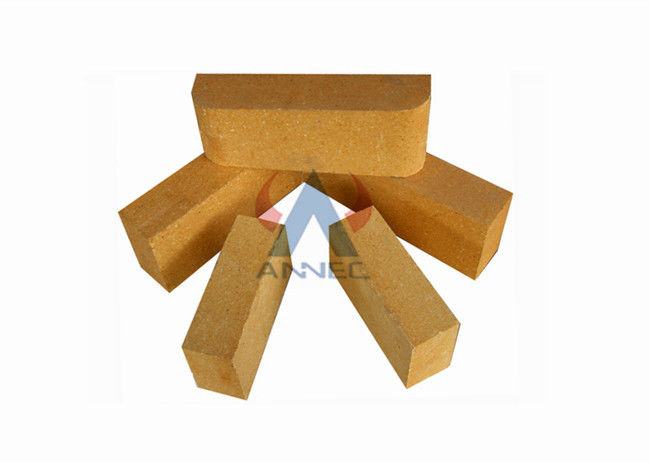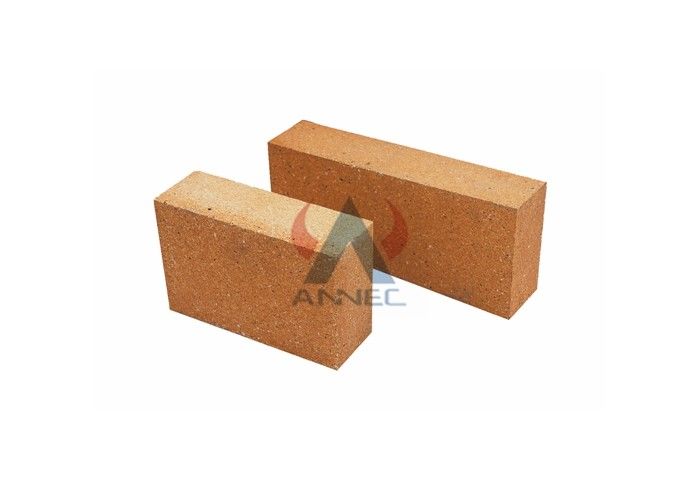Red Special Shaped 69.8% SiO2 2.4g Clay Refractory Brick
Physical and chemical indexes:
| Item |
Unit |
Index |
| Bulk density |
g/cm2 |
2.31-2.4 |
| Water absorption |
% |
<0.5 |
| Acid resistance |
% |
99.8 |
| Flexural strength |
Mpa |
42 |
| Crushing stength |
Mpa |
120 |
| Thermal stability |
130°c-20°c |
No crackle after 3 times |
Chemical composition (%)
| SiO2 |
Al2O3 |
K2O |
Na2O |
CaO |
MgO |
Fe2O3 |
| 69.8 |
22.5 |
2.7 |
0.95 |
0.82 |
0.82 |
0.49 |
The mineral composition of Thermal Insulation Material Special Shaped Refractory Brick is mainly kaolinite (Al2O3·2SiO2·2H2O) and 6%~7% impurities (oxides of potassium, sodium, calcium, titanium and iron).
The firing process of Thermal Insulation Material Special Shaped Refractory Brick is mainly the process of continuous dehydration and decomposition of kaolin to form mullite (3Al2O3·2SiO2) crystals.
The SiO2 and Al2O3 in the Thermal Insulation Material Special Shaped Refractory Brick form eutectic low-melting silicate with impurities during the firing process, which surrounds the mullite crystals.
Thermal Insulation Material Special Shaped Refractory Brick are weakly acidic refractory products, which can resist the erosion of acidic slag and acidic gas, and have a slightly weaker resistance to alkaline substances. Clay bricks have good thermal properties and are resistant to rapid cold and rapid heat
Competitive Advantage:
-
Competitive Price. Make the products competitive in your market.
-
Abundant Experience. Prevent cracks and twist in bricks.
-
Different Moulds. Save mould fees for you.
-
Strict Quality Control. Meet clients’ quality requirement.
-
Large stocks. Guarantee prompt delivery.
-
Professional Packing. Avoid damage and secure the goods in transportation
Features
1. as high acid resistance
2. Low water absorption
3. Oxidation at room temperature is not easy
5. High pressure resistance
6. Easy to clean
7. Strong acid and alkali corrosion resistance (parameter>99.8)
8. Convenient for installation
9. Uniform gas and liquid distribution
10. Reliable structure and chemical stability
11. Long service life, more than 3 years warranty
12. High Working temperature: 1650-1720C
13. Accurate size, small Tolerance
The Thermal Insulation Material Special Shaped Refractory Brick is comparable to that of silica bricks, up to 1690~1730℃, but the softening temperature under load is more than 200℃ lower than that of silica bricks.
In addition to the high refractory mullite crystals, the clay bricks also contain nearly half of the low melting point amorphous glass phase.
In the temperature range of 0~1000℃, the volume of Thermal Insulation Material Special Shaped Refractory Brick expands uniformly as the temperature rises.
The linear expansion curve is approximately a straight line, and the linear expansion rate is 0.6%~0.7%, which is only about half of that of silica bricks.
When the temperature reaches 1200 ℃ and then continue to rise, its volume will start to shrink from the maximum expansion.
The residual shrinkage of Thermal Insulation Material Special Shaped Refractory Brick leads to the loosening of mortar joints in masonry, which is a major disadvantage of clay bricks.
When the temperature exceeds 1200°C, the low melting point substances in the Thermal Insulation Material Special Shaped Refractory Brick gradually melt, and the particles are tightly pressed against each other due to surface tension, resulting in volume shrinkage.
Production practice in China has proved that before crushing, high-aluminum clinker is strictly sorted and classified, and stored in tiers.
The use of bauxite clinker and combined clay fin grinding method can improve product quality.



 Your message must be between 20-3,000 characters!
Your message must be between 20-3,000 characters! Please check your E-mail!
Please check your E-mail!  Your message must be between 20-3,000 characters!
Your message must be between 20-3,000 characters! Please check your E-mail!
Please check your E-mail! 

